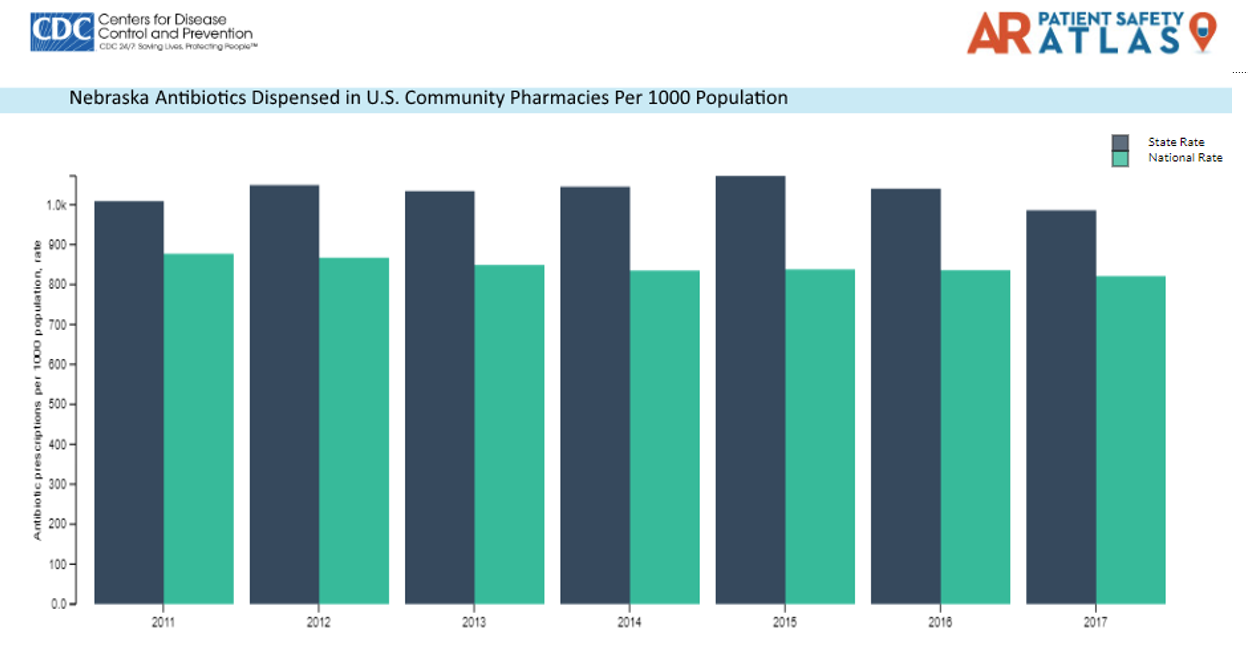 Content provided courtesy Dr. Salman Ashraf: Associate Medical Director, Nebraska Antimicrobial Stewardship Assessment and Promotion Program (ASAP) & Medical Director, Nebraska Infection Control Assessment and Promotion Program (ICAP)
Content provided courtesy Dr. Salman Ashraf: Associate Medical Director, Nebraska Antimicrobial Stewardship Assessment and Promotion Program (ASAP) & Medical Director, Nebraska Infection Control Assessment and Promotion Program (ICAP)
CDC’s most recent (2019) report on Antibiotic Resistance Threats in the United States describes 2.8 million infections due to antibiotic resistant organisms in the US resulting in over 35,000 deaths annually. The Division of Infectious Diseases at University of Nebraska Medical Center (UNMC) and Nebraska Medicine (NM) is collaborating with Nebraska DHHS Healthcare-Associated Infections/Antimicrobial Resistance (HAI/AR) program via a CDC grant to decrease the prevalence of antibiotic resistance throughout Nebraska, through the Nebraska Antimicrobial Stewardship Assessment and Promotion Program (ASAP).
Some notable activities of Nebraska ASAP initiative include:
- Assisting over 30 healthcare facilities in the state in developing or improving their antimicrobial stewardship program
- Creating a website focused on promoting ASP in healthcare facilities by providing tools and templates specific to the different healthcare settings. Since its inception in August 2017, the Nebraska ASAP website has been visited by over 12000 users both nationally and internationally and has earned the reputation of a national resource for facilities looking into developing or improving their ASP.
- Organizing Antimicrobial Stewardship Summits for the state of Nebraska in 2018 and 2019 to provide education to over 250 ASP program professional, and four smaller sessions were held in different cities to reach out to those who were not able to attend the main summit.
- Establishing the Nebraska ASAP YouTube Channel in February 2018 hosting all of the educational videos developed by the team, with over 20,000 views so far.
- Sharing our experience with healthcare community at various national meetings. (Available at https://asap.nebraskamed.com/about/selected-publications-and-presentations/)
- Collaborating with Nebraska Medicine ASP to reduce antibiotic prescribing in outpatient clinics for acute bronchitis by 10%.
- Launching a free online educational training on management of acute respiratory infections in outpatient setting which includes a presentation on communication strategies with patients. [CME credits available until 2020]
- Initiating a collaborative project to decrease Clostridioides difficile infections in acute and long-term care facilities in the state.
As ASAP team members, UNMC/NM subject matter experts are supporting DHHS HAI/AR team’s fight against antimicrobial resistance. In addition to the ASAP activities, Nebraska DHHS HAI/AR team has launched several other initiatives focused on promoting appropriate antimicrobial use in the state. The DHHS HAI/AR team is committed to the CDC AMR challenge and have developed an antimicrobial susceptibility registry that can detect resistant organisms early so facilities can be assisted in containing the spread of multi-drug resistant organisms. The DHHS HAI/AR program also works closely with relevant stakeholders in the state such as Great Plains QIN/QIO, various healthcare associations, Nebraska Pharmacist association and other healthcare systems and organizations to achieve the common goal of promoting appropriate antibiotic prescribing and decrease antimicrobial resistance. They are also collaborating with Nebraska One Health to prevent misuse of antibiotics in livestock industry and agriculture.
The statewide efforts of DHHS HAI/AR program including Nebraska ASAP along with the amazing work done by our partner organizations, healthcare facilities and healthcare professionals have had positive impact on antimicrobial stewardship programs and antimicrobial resistance in Nebraska. Our MRSA bacteremia and C. difficile rates are 58% and 17%, lower than the national baseline, respectively. The number of hospitals meeting all 7 CDC-recommended core elements of antimicrobial stewardship program have been on the rise in the last few years with 81% of the hospitals reporting to NHSN meeting all core elements in 2018 as compared to 31% in 2015.
 While these findings are very encouraging there is still opportunity for improvement. Nebraska is still in the Top 10 rates of outpatient antibiotic prescribing and is significantly above the national average of 821 prescriptions per 1000 population. An encouraging finding has been a recent decline to 986 prescriptions per 1,000 population in 2017 which was the first time the rate had dropped below 1000. We are committed to build on this success and are planning to roll out new initiatives focused on improving outpatient antibiotic prescribing practices.
While these findings are very encouraging there is still opportunity for improvement. Nebraska is still in the Top 10 rates of outpatient antibiotic prescribing and is significantly above the national average of 821 prescriptions per 1000 population. An encouraging finding has been a recent decline to 986 prescriptions per 1,000 population in 2017 which was the first time the rate had dropped below 1000. We are committed to build on this success and are planning to roll out new initiatives focused on improving outpatient antibiotic prescribing practices.
In a nutshell, the unique model of public health department (NE DHHS HAI/AR program) and academia (UNMC/NM) partnership has facilitated antimicrobial stewardship efforts in Nebraska. This model has been very effective in making antimicrobial stewardship experts available to resource limited healthcare settings (such as critical access hospitals and long-term care facilities), which otherwise lack access to such expertise. Other states may also benefit from developing such partnerships in order to fight antimicrobial resistance and raising awareness of the risk of inappropriate antibiotic use.
